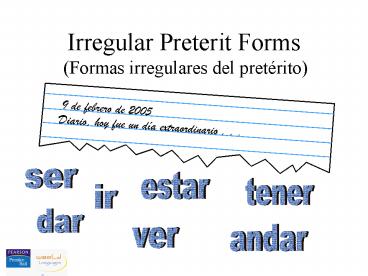Irregular preterit II - PowerPoint PPT Presentation
1 / 12
Title: Irregular preterit II
1
Irregular Preterit Forms
(Formas irregulares del pretérito)
ser
estar
tener
ir
dar
andar
ver
2
Irregular preterit forms
ser, ir
The verbs ser and ir are conjugated identically
in the preterit. The context of the sentence or
the situation will clarify the meaning.
ser, ir
fui
fuimos
?
fuiste
fuisteis
fue
fueron
Notice that the first- and third-persons
singular, fui and fue, do not bear a written
accent. As we learned earlier, single-syllable
preterit forms need no written accent.
3
Irregular preterit forms
ser, ir
La fiesta fue en casa de Jorge, pero Jorge mismo
no fue.
The party was at Jorges house, but Jorge himself
didnt go.
Yo fui a la comisaría de policía para asegurarles
que el que cometió el crimen no fui yo.
I went to the police station to assure them that
I was not the one who committed the crime.
4
Irregular preterit forms
estar, andar, tener
e (no accent)
estuv-
estar
?
iste
o (no accent)
anduv-
andar
?
imos
tuv-
tener
?
isteis
ieron
Notice that estar, andar and tener have a similar
change in their stems . . .
and take the same verb endings, even though estar
and andar are -ar verbs, and tener an -er verb.
5
Irregular preterit forms
estar ? estuv
Estuve en España por tres meses.
I was in Spain for three months.
Por qué no estuviste en clase ayer?
Why werent you in class yesterday?
Carlos estuvo estudiando todo el día.
Carlos was studying all day.
Estuvimos enfermos en casa la semana pasada.
We were sick at home last week.
Carla y Olga estuvieron en la fiesta.
Carla and Olga were at the party.
6
Irregular preterit forms
andar ? anduv
Anduve a la escuela esta mañana.
I walked to school this morning.
Anduviste solo o acompañado?
Did you walk alone or with someone?
El niño anduvo por primera vez a los doce meses.
The child walked for the first time at twelve
months of age.
Anduvimos por el parque y fuimos al museo.
We walked through the park and went to the museum.
Los novios anduvieron juntos por la plaza.
The lovers walked together around the plaza.
7
Irregular preterit forms
tener ? tuv
Tuve suerte jugando a la lotería.
I had luck playing the lottery.
Tuviste un resfriado el mes pasado?
Did you have a cold last month?
Ana tuvo que trabajar la Víspera del Año Nuevo.
Ana had to work on New Years Eve.
Tuvimos una habitación muy cómoda en el hotel.
We had a very comfortable room in the hotel.
Ester y Roberto tuvieron una boda muy linda.
Ester and Roberto had a very lovely wedding.
8
Irregular preterit forms
dar
The -ar verb dar is conjugated in the preterit as
if it were a regular -er/-ir verb.
di
dimos
diste
disteis
dio
dieron
Again, since the first- and third-persons
singular di and dio consist of a single syllable,
they need no written accent.
9
Irregular preterit forms
dar
Le di un regalito a mi novia.
I gave a little gift to my girlfriend.
Diste una fiesta de bienvenida para Tito, no?
You gave a welcoming party for Tito, didnt you?
Teodoro me dio las entradas para el concierto.
Teodoro gave me the tickets for the concert.
Les dimos limosnas a los pobres.
We gave alms to the poor.
Los profesores no dieron clases este verano.
The professors didnt give (teach) classes this
summer.
10
Irregular preterit forms
ver
The verb ver is a regular -er verb in the
preterit but, of course, its first- and
third-persons singular have no written accent
since they are single-syllable forms.
vi
vimos
viste
visteis
vio
vieron
11
Irregular preterit forms
ver
Vi a Ernesto ayer en el almacén.
I saw Ernesto yesterday in the department store.
Viste la última película de Pedro Almodóvar?
Did you see Pedro Almodóvars latest film?
Mi hermano vio al delincuente robar la tienda.
My brother saw the criminal rob the store.
Vimos las fotos que Juan sacó en Chile.
We saw the photos that Juan took in Chile.
Los niños vieron a Papá Noel en el centro.
The children saw Santa Claus downtown.
12
FIN































